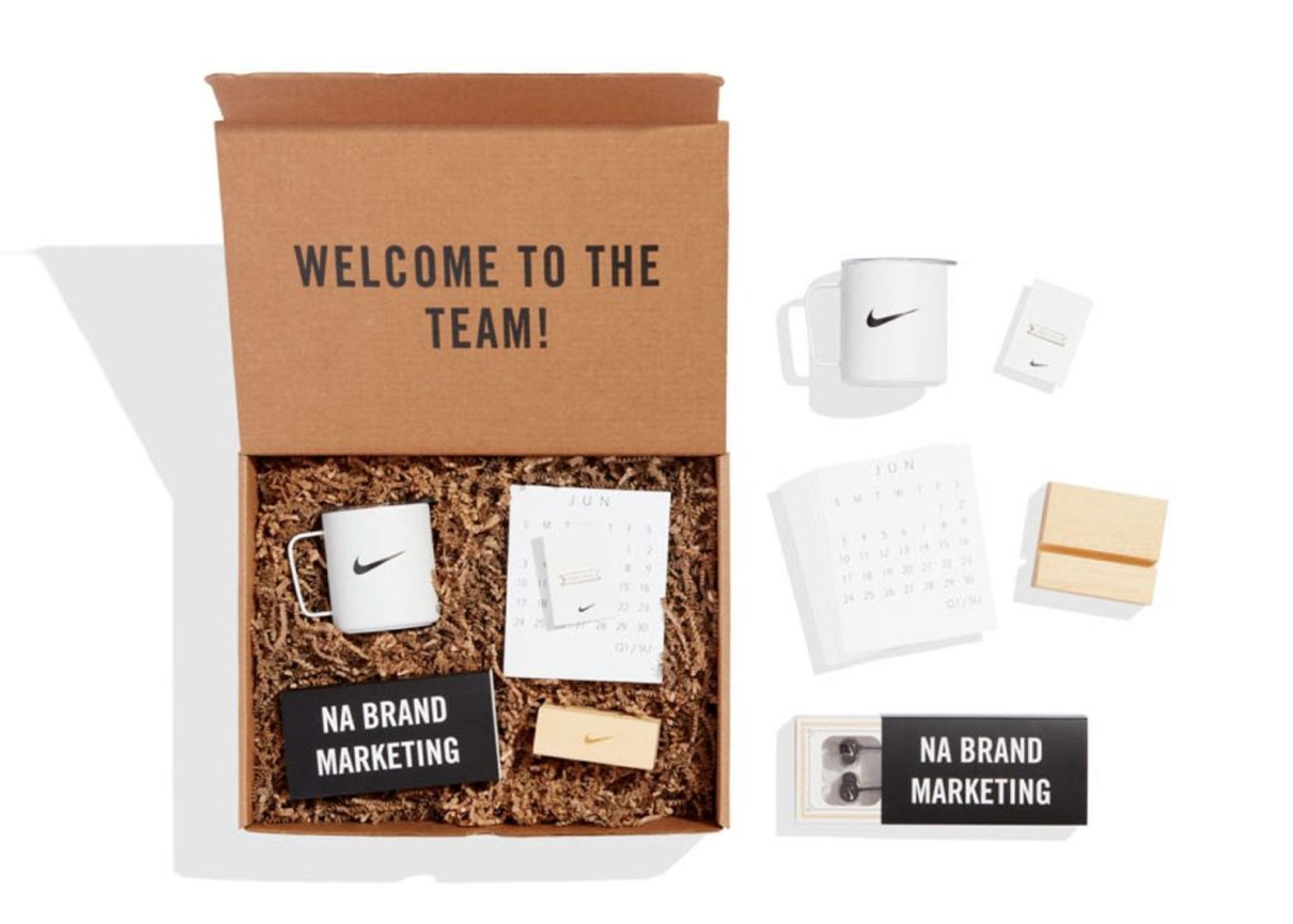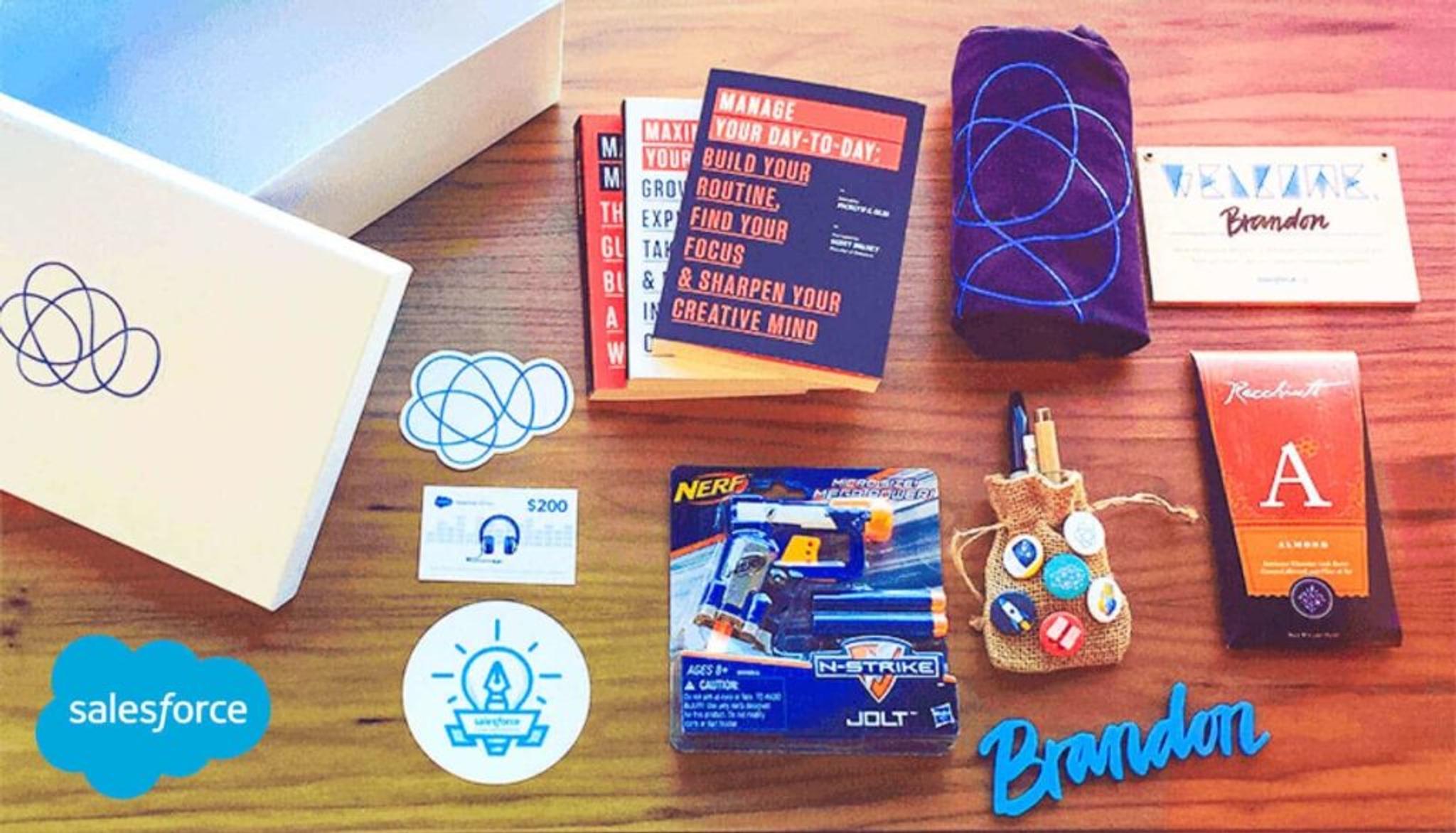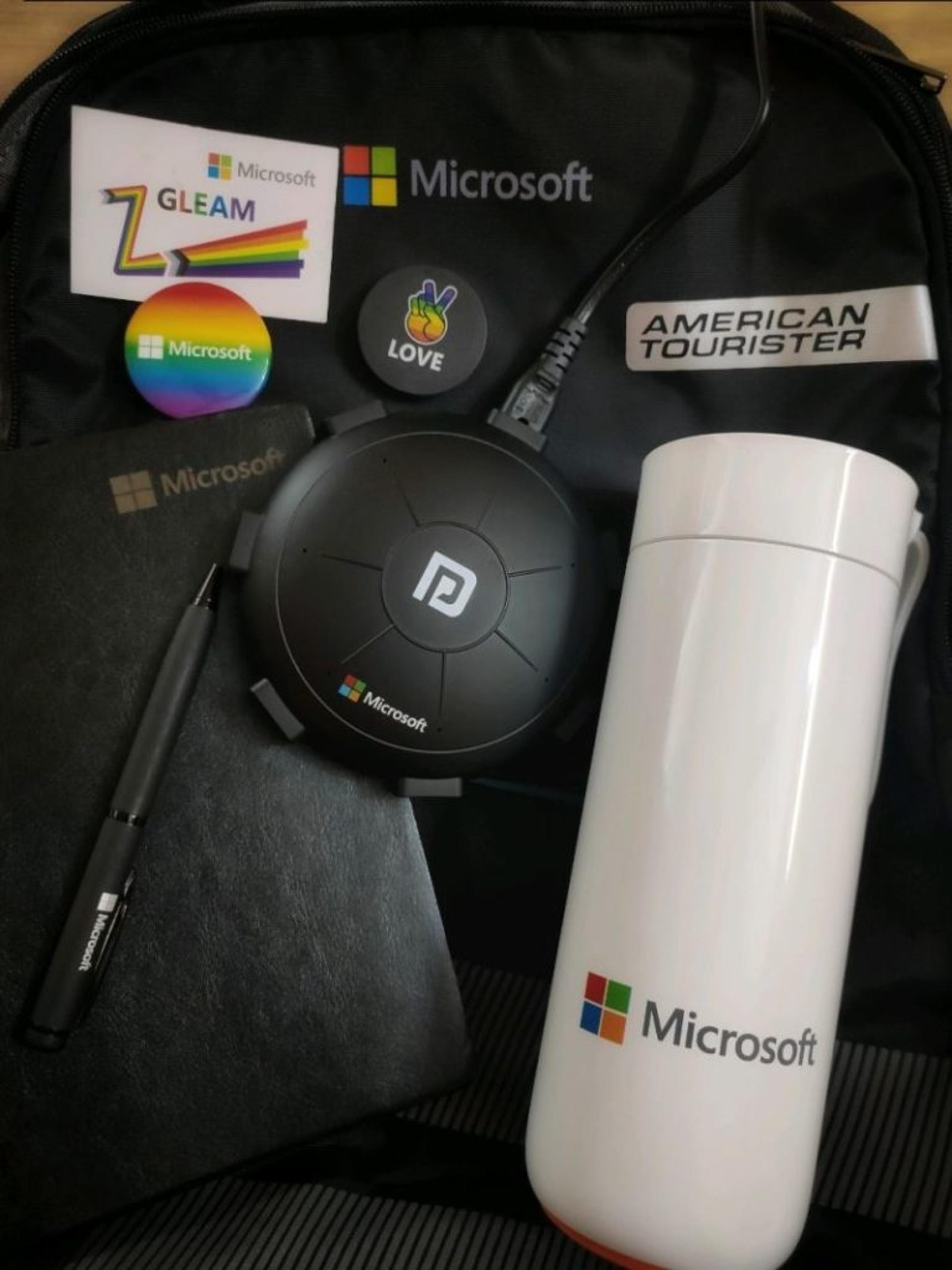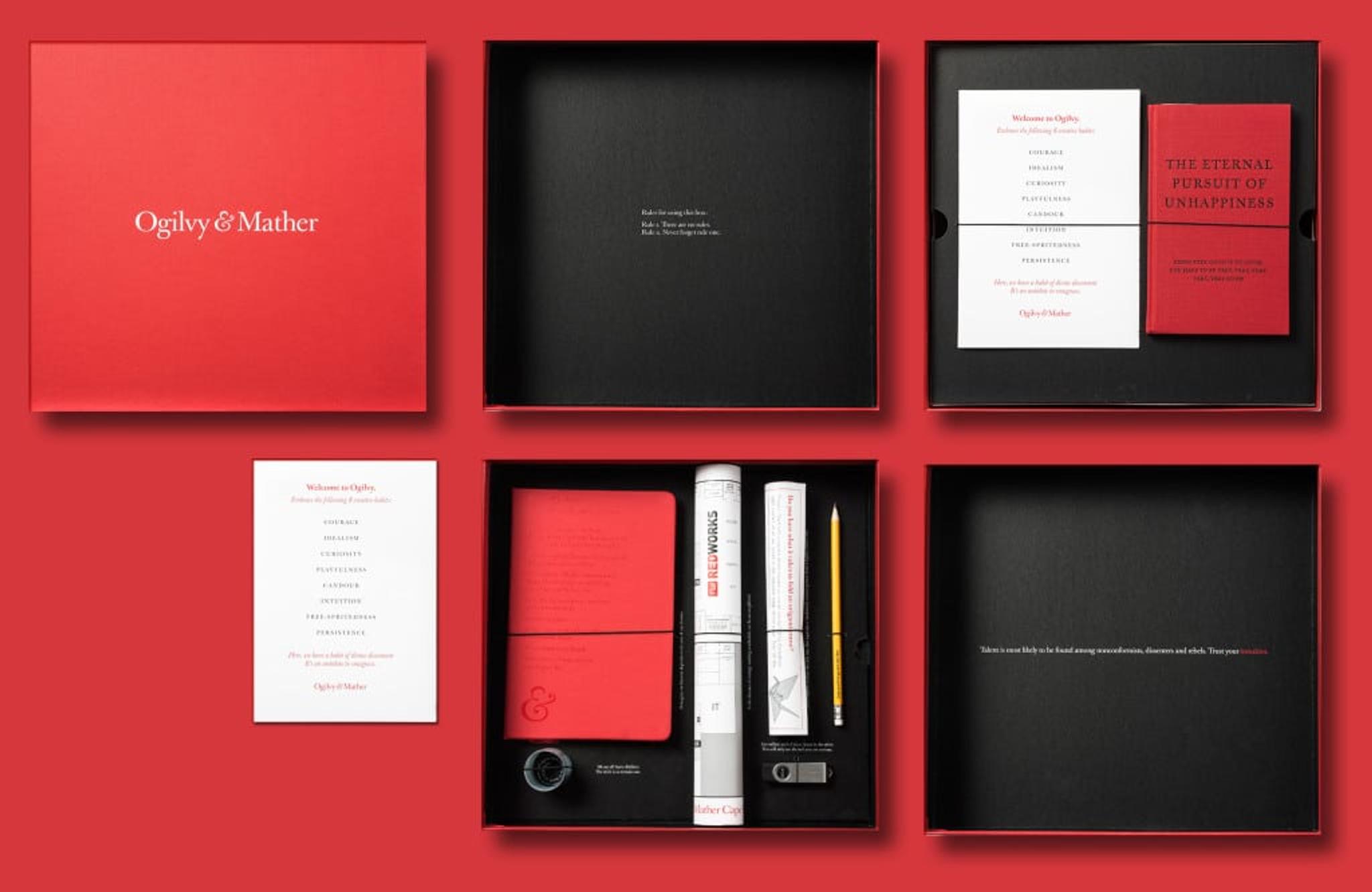
Eddy’s HR Mavericks Encyclopedia
The world's largest free encyclopedia of HR, with 700+ HR articles and podcasts.
Created by Eddy and our HR Mavericks community.
Welcome Packet
New employees have a lot to walk into on their first day. It’s common to feel “firehosed” with information through the interview process. And when the excitement subsides and they’re shown to their new desk for the first time, many new employees feel overwhelmed with questions they forgot to ask. To workers on their first day, the organization can feel like a labyrinth of teams, hierarchies, and hallways where they’ll inevitably get lost. To keep your new hires from floundering, as well as to help them hit the ground running and feel valued by their new employer, you want to make sure they’re aware of all the resources available to them. This is where welcome packets come in.
What Is a New Employee Welcome Packet?
A new employee welcome packet is a collection of paperwork, resources, information, and welcome items provided to new hires on their first day. No matter how simple the business seems to you, to new hires it’s a complex and intimidating organization that they just dove headfirst into. New hires will have many questions that are critical to have answered, but can be awkward or even embarrassing to ask. New employee welcome packets help answer these questions before the employee needs to ask them. They also provide helpful resources and directions concerning employment that new employees can keep for reference. They help new employees get settled, comfortable and ready to tackle their new position. Welcome packets can come in physical or digital formats. Many HRIS softwares make it easy to send over paperwork and other information. But remember that some items in this packet, like new hire gifts, come best in a tangible form.
Welcome Packets Versus Onboarding Materials
Welcome packets are not just packets of onboarding paperwork. Onboarding materials (like I-9s, direct deposit authorization forms or non-disclosure agreements) are critical, but they don’t quite do the job of welcoming new employees and setting them up for success. There’s more you can give your employees on their first day to help them feel ready to go. In addition to onboarding materials, make sure to include the items suggested below.
Why You Should Prepare a Welcome Packet for New Employees
Welcome packets help new hires succeed, and these employees, in turn, help the company succeed. Here are some of the ways this happens.
- New employees will feel less overwhelmed. All new employees have to deal with receiving a firehose of information, which can be overwhelming. Summarizing important information on paper about the company and their team will reduce the pressure to memorize everything they’ve been told.
- New employees will hit the ground running. A welcome packet frees up employee brainpower to get started on their actual work, rather than on wandering halls, inquiring coworkers and organizing scrambled notes and contacts.
- Expectations are better communicated. Expectations are more likely to be met when they’re communicated effectively. Writing down baseline expectations for new employees will help them remember what’s most important and how they should be spending their time.
- New employees will feel more welcomed and excited. New employees will feel valued when they see how considerate their new employer is in providing them with a welcome packet. Welcome gifts go a long way.
- Less time will be spent asking and answering questions. Answer all the questions you expect new employees to have on paper. Both they and their new coworkers will be grateful.
What to Include in Your New Employee Welcome Packet—a Checklist
Here are some good ideas of what to include in your welcome packets. Want to save the following information? Download the welcome packet checklist.
Onboarding Materials
Here is some of the more necessary paperwork to have your new employees fill out on their first day.
- New hire paperwork. Include I-9 forms, confidentiality agreements, terms and conditions of employment, contracts, etc. as necessary depending on the job.
- Emergency contact form. You can’t collect emergency contact information too soon.
- Onboarding activities and training. Make sure your new employee knows the where, what and when of new hire trainings they need to attend. This includes kickoff meetings with their manager.
General Company Information
These are more general points of information to help the new employee find their way around the office.
- CEO welcome letter. This letter should focus on welcoming the employee to the company. It doesn’t need to go into detail about specific policies; instead, it should focus on higher-level information that will set the stage for the new hire’s overall work experience.
- Office map. Make it easy for new employees to find bathrooms, break rooms and supply closets.
- Opening and closing times. Including opening and closing hours makes it handy for your new employees to know when they can come in and when they should leave.
- Parking options. Parking can be tricky in big cities. Including some guidance and options on where to park will be helpful.
- Employee directory. Share how to use the directory and who they’re likely to be contacting most often.
- Organizational charts. Organization charts help employees know who to go to for which problems. Help them utilize their team members.
- Resource reference sheet. Provide the locations and contacts for employee administrative resources like HR, IT and payroll.
- Compensation and benefits. Give new employees details on paydays, insurance, retirement and any other benefits they’re eligible for.
- Local hotspots. List some local restaurants, coffee shops and cafes that employees like to go to.
Introduction to Company Culture
An employee’s first day is a great time to describe in detail the company culture and how it applies to their work. This is also an opportunity to invite them to get involved.
- Company mission, vision and values. Help keep the company values front-of-mind for new employees. Share examples of how they’re demonstrated within the company.
- Company groups and initiatives. Show new employees how to get involved with company-sponsored groups or volunteer opportunities.
- Links to the company website and social media accounts. Help new employees engage with the company’s online communities.
- New hire questionnaire. Get to know your new hire better by having them fill out a survey about themselves. Among other things, you can ask questions about how they prefer to learn, work, and be managed. The results of the survey will help you find ways to make the new hire more comfortable as they start work.
Position and Team Details
Describe the details unique to their job and team, as well as the resources available to help them in their responsibilities.
- Job expectations and performance standards. Share baseline expectations, quotas or standards of excellence for their new job.
- Team/department goals and priorities. Share existing goals and priorities of the team the new hire is joining. Introduce them to their team and the joint goals they’ll be working to accomplish together.
- Mentor information. If new hires are assigned a mentor or buddy, make sure contact information is exchanged.
- Explanations of software tools. Your company’s likely to have software that new employees aren’t familiar with. Share with them which tools are used for which functions and how to use them.
Access Keys and Login Credentials
You don’t want figurative or physical walls keeping your employee from the tools and people they need. Make sure they can get where they need to go.
- Usernames and passwords to computers and software. Get all credentials set up at one time so new employees don’t have to repeatedly visit IT for help.
- Keys, access cards and employee IDs. Ensure new employees have all the access they need to get their job done.
- Wifi login information. Show which wifi to connect to along with the login credentials for their work devices and personal cell phone.
Policies and Guidelines
It’s important to share with new employees your workplace policies and guidelines. This will decrease liability and increase safety and efficiency.
- Workplace policies. Communicate the policies for cell phone usage, dress code, work computer usage, break times, etc.
- HR policies. Make sure new employees know policies surrounding harassment, safety, leave, etc.
- Employee handbook. Provide the employee with the most recent copy of the employee handbook. Employee handbooks can contain many of these welcome packet materials.
New Hire Gifts
Gifts from the company help new hires feel welcomed and valued. They also get employees feeling excited about the company and about being a part of the team.
- Apparel. Try a T-shirt, hoodie or socks with the company logo on them.
- Gear. Some jobs would benefit from gear like a headset, flash drive or laptop case.
- Office accessories. Give them supplies for their desk like sticky notes, pens or a notebook.
- Company culture gifts. Show off your culture through wellness and environmentally-friendly gifts through or a personalized note.
Examples of New Employee Welcome Packets
Need inspiration for putting together an outstanding welcome packet? Here are a few examples of what top companies include (in addition to the informational materials discussed above).
Nike
What's included: cup, calendar, headphones, pin.

DropBox
What's included: mug, coffee, journal, pen, laptop stickers, welcome note.

Salesforce
What's included: books, gift card, name tag, toy gun, pens, snacks.

Microsoft
What's included: stationary, branded bottle, journal and pens, buttons, USB hub port.

Ogilvy & Mather
What's included: company history and values book, USB drive, journal, custom pencil.

How Eddy Can Improve Your Hiring & Onboarding Processes
Before getting welcome packets sorted out, you need to find the right person for the job. Then, it's all about helping them transition smoothly to their new role. Here are a few ways Eddy can help.
Eddy Hire
Eddy's applicant tracking system (ATS) lets you start strong by posting jobs for free to top job boards like Indeed, ZipRecruiter, and more. Once the qualified candidates start rolling in, Eddy Hire helps by streamlining candidate correspondence, storing interview notes in a central location, and keeping everyone on the hiring team in the loop. Find out more about how Eddy Hire can improve your hiring process.
Eddy People
Eddy People makes onboarding a breeze. Instead of having employees spend their first morning of work sitting in a corner signing documents, you can send them digital documents that only take a few minutes to fill out. And onboarding is just the beginning; Eddy People takes care of HR functions throughout the employee lifecycle. Learn how Eddy People can handle tedious HR tasks for you.
Topics

Brandon Fluckiger
Brandon is currently a People & Capabilities Advisor at Thiess where he helps implement HR strategies in Salt Lake City and Colorado. He recently graduated with his MHR and MBA at Utah State University, where he also received his bachelor’s degree in Communication Studies with minors in HR, business management, and technical sales management. He has filled professional roles as an HR business partner, an HR generalist, and a senior recruiter; and has exceptional experience in people analytics, compensation, and talent development. Brandon is a strong advocate for HR strategy and helping business leaders understand the true power of maximizing employee potential.
Frequently asked questions
Other Related Terms
Eddy’s HR Mavericks Encyclopedia
Welcome Packet
New employees have a lot to walk into on their first day. It’s common to feel “firehosed” with information through the interview process. And when the excitement subsides and they’re shown to their new desk for the first time, many new employees feel overwhelmed with questions they forgot to ask. To workers on their first day, the organization can feel like a labyrinth of teams, hierarchies, and hallways where they’ll inevitably get lost. To keep your new hires from floundering, as well as to help them hit the ground running and feel valued by their new employer, you want to make sure they’re aware of all the resources available to them. This is where welcome packets come in.
What Is a New Employee Welcome Packet?
A new employee welcome packet is a collection of paperwork, resources, information, and welcome items provided to new hires on their first day. No matter how simple the business seems to you, to new hires it’s a complex and intimidating organization that they just dove headfirst into. New hires will have many questions that are critical to have answered, but can be awkward or even embarrassing to ask. New employee welcome packets help answer these questions before the employee needs to ask them. They also provide helpful resources and directions concerning employment that new employees can keep for reference. They help new employees get settled, comfortable and ready to tackle their new position. Welcome packets can come in physical or digital formats. Many HRIS softwares make it easy to send over paperwork and other information. But remember that some items in this packet, like new hire gifts, come best in a tangible form.
Welcome Packets Versus Onboarding Materials
Welcome packets are not just packets of onboarding paperwork. Onboarding materials (like I-9s, direct deposit authorization forms or non-disclosure agreements) are critical, but they don’t quite do the job of welcoming new employees and setting them up for success. There’s more you can give your employees on their first day to help them feel ready to go. In addition to onboarding materials, make sure to include the items suggested below.
Why You Should Prepare a Welcome Packet for New Employees
Welcome packets help new hires succeed, and these employees, in turn, help the company succeed. Here are some of the ways this happens.
- New employees will feel less overwhelmed. All new employees have to deal with receiving a firehose of information, which can be overwhelming. Summarizing important information on paper about the company and their team will reduce the pressure to memorize everything they’ve been told.
- New employees will hit the ground running. A welcome packet frees up employee brainpower to get started on their actual work, rather than on wandering halls, inquiring coworkers and organizing scrambled notes and contacts.
- Expectations are better communicated. Expectations are more likely to be met when they’re communicated effectively. Writing down baseline expectations for new employees will help them remember what’s most important and how they should be spending their time.
- New employees will feel more welcomed and excited. New employees will feel valued when they see how considerate their new employer is in providing them with a welcome packet. Welcome gifts go a long way.
- Less time will be spent asking and answering questions. Answer all the questions you expect new employees to have on paper. Both they and their new coworkers will be grateful.
What to Include in Your New Employee Welcome Packet—a Checklist
Here are some good ideas of what to include in your welcome packets. Want to save the following information? Download the welcome packet checklist.
Onboarding Materials
Here is some of the more necessary paperwork to have your new employees fill out on their first day.
- New hire paperwork. Include I-9 forms, confidentiality agreements, terms and conditions of employment, contracts, etc. as necessary depending on the job.
- Emergency contact form. You can’t collect emergency contact information too soon.
- Onboarding activities and training. Make sure your new employee knows the where, what and when of new hire trainings they need to attend. This includes kickoff meetings with their manager.
General Company Information
These are more general points of information to help the new employee find their way around the office.
- CEO welcome letter. This letter should focus on welcoming the employee to the company. It doesn’t need to go into detail about specific policies; instead, it should focus on higher-level information that will set the stage for the new hire’s overall work experience.
- Office map. Make it easy for new employees to find bathrooms, break rooms and supply closets.
- Opening and closing times. Including opening and closing hours makes it handy for your new employees to know when they can come in and when they should leave.
- Parking options. Parking can be tricky in big cities. Including some guidance and options on where to park will be helpful.
- Employee directory. Share how to use the directory and who they’re likely to be contacting most often.
- Organizational charts. Organization charts help employees know who to go to for which problems. Help them utilize their team members.
- Resource reference sheet. Provide the locations and contacts for employee administrative resources like HR, IT and payroll.
- Compensation and benefits. Give new employees details on paydays, insurance, retirement and any other benefits they’re eligible for.
- Local hotspots. List some local restaurants, coffee shops and cafes that employees like to go to.
Introduction to Company Culture
An employee’s first day is a great time to describe in detail the company culture and how it applies to their work. This is also an opportunity to invite them to get involved.
- Company mission, vision and values. Help keep the company values front-of-mind for new employees. Share examples of how they’re demonstrated within the company.
- Company groups and initiatives. Show new employees how to get involved with company-sponsored groups or volunteer opportunities.
- Links to the company website and social media accounts. Help new employees engage with the company’s online communities.
- New hire questionnaire. Get to know your new hire better by having them fill out a survey about themselves. Among other things, you can ask questions about how they prefer to learn, work, and be managed. The results of the survey will help you find ways to make the new hire more comfortable as they start work.
Position and Team Details
Describe the details unique to their job and team, as well as the resources available to help them in their responsibilities.
- Job expectations and performance standards. Share baseline expectations, quotas or standards of excellence for their new job.
- Team/department goals and priorities. Share existing goals and priorities of the team the new hire is joining. Introduce them to their team and the joint goals they’ll be working to accomplish together.
- Mentor information. If new hires are assigned a mentor or buddy, make sure contact information is exchanged.
- Explanations of software tools. Your company’s likely to have software that new employees aren’t familiar with. Share with them which tools are used for which functions and how to use them.
Access Keys and Login Credentials
You don’t want figurative or physical walls keeping your employee from the tools and people they need. Make sure they can get where they need to go.
- Usernames and passwords to computers and software. Get all credentials set up at one time so new employees don’t have to repeatedly visit IT for help.
- Keys, access cards and employee IDs. Ensure new employees have all the access they need to get their job done.
- Wifi login information. Show which wifi to connect to along with the login credentials for their work devices and personal cell phone.
Policies and Guidelines
It’s important to share with new employees your workplace policies and guidelines. This will decrease liability and increase safety and efficiency.
- Workplace policies. Communicate the policies for cell phone usage, dress code, work computer usage, break times, etc.
- HR policies. Make sure new employees know policies surrounding harassment, safety, leave, etc.
- Employee handbook. Provide the employee with the most recent copy of the employee handbook. Employee handbooks can contain many of these welcome packet materials.
New Hire Gifts
Gifts from the company help new hires feel welcomed and valued. They also get employees feeling excited about the company and about being a part of the team.
- Apparel. Try a T-shirt, hoodie or socks with the company logo on them.
- Gear. Some jobs would benefit from gear like a headset, flash drive or laptop case.
- Office accessories. Give them supplies for their desk like sticky notes, pens or a notebook.
- Company culture gifts. Show off your culture through wellness and environmentally-friendly gifts through or a personalized note.
Examples of New Employee Welcome Packets
Need inspiration for putting together an outstanding welcome packet? Here are a few examples of what top companies include (in addition to the informational materials discussed above).
Nike
What's included: cup, calendar, headphones, pin.

DropBox
What's included: mug, coffee, journal, pen, laptop stickers, welcome note.

Salesforce
What's included: books, gift card, name tag, toy gun, pens, snacks.

Microsoft
What's included: stationary, branded bottle, journal and pens, buttons, USB hub port.

Ogilvy & Mather
What's included: company history and values book, USB drive, journal, custom pencil.

How Eddy Can Improve Your Hiring & Onboarding Processes
Before getting welcome packets sorted out, you need to find the right person for the job. Then, it's all about helping them transition smoothly to their new role. Here are a few ways Eddy can help.
Eddy Hire
Eddy's applicant tracking system (ATS) lets you start strong by posting jobs for free to top job boards like Indeed, ZipRecruiter, and more. Once the qualified candidates start rolling in, Eddy Hire helps by streamlining candidate correspondence, storing interview notes in a central location, and keeping everyone on the hiring team in the loop. Find out more about how Eddy Hire can improve your hiring process.
Eddy People
Eddy People makes onboarding a breeze. Instead of having employees spend their first morning of work sitting in a corner signing documents, you can send them digital documents that only take a few minutes to fill out. And onboarding is just the beginning; Eddy People takes care of HR functions throughout the employee lifecycle. Learn how Eddy People can handle tedious HR tasks for you.
Topics

Brandon Fluckiger
Brandon is currently a People & Capabilities Advisor at Thiess where he helps implement HR strategies in Salt Lake City and Colorado. He recently graduated with his MHR and MBA at Utah State University, where he also received his bachelor’s degree in Communication Studies with minors in HR, business management, and technical sales management. He has filled professional roles as an HR business partner, an HR generalist, and a senior recruiter; and has exceptional experience in people analytics, compensation, and talent development. Brandon is a strong advocate for HR strategy and helping business leaders understand the true power of maximizing employee potential.
Frequently asked questions
Other Related Terms
Eddy's HR Newsletter
Sign up for our email newsletter for helpful HR advice and ideas.


